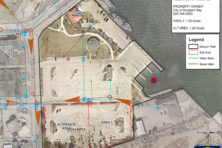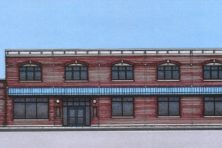Sturgeon Bay Common Council Agrees on Fleet Farm Terms
- Share
- Tweet
- Pin
- Share

Sturgeon Bay’s Common Council voted unanimously Tuesday in favor of a series of parameters to include in a development agreement with Fleet Farm to build a new store along the west entrance to the city. Mayor David Ward said the council’s action authorizes a development agreement to be put together for Fleet Farm that will come back to the council for final approval.
Fleet Farm wants to construct a 91,000-square-foot retail store with an automotive service center, exterior yard, gas station and two-bay car wash on an approximately 40-acre site annexed from the Town of Nasewaupee, south of where Grant Avenue connects with Highway 42/57.
The council last month favored establishing a development agreement with Fleet Farm, but it rejected a different series of parameters that didn’t address what the city’s obligation could be should traffic lights be required for the intersection of Grant Avenue and the highway with access to the south for the store being built there.
“Following the last time the council touched this, we took that directive as a kind of sign to go back and broaden our scope of thinking on the appropriate use of public investment in the project,” said city administrator Josh VanLieshout.
The parameters proposed by city staff that the council approved Tuesday include the following four conditions:
- The city agrees to contribute $425,000 (about one-third) toward the cost of the public street, intersection and utility improvements for the project.
- Fleet Farm agrees to dedicate the right-of-way needed for the extension of South Grant Avenue through the property.
- Fleet Farm agrees to construct the street and install the utilities.
- Fleet Farm agrees to a minimum assessed value of $8 million for the property for a period of 10 years, beginning with the first tax year following occupancy of the building.
Upon the council’s approval of those parameters, the city attorney will draft a formal development agreement.
VanLieshout said a minimum assessed value of $8 million would generate around $70,000 in property-tax revenue annually for the city and approximately $175,000 in total property taxes each year.
“A lot of value [is] being created by this particular project,” he said.
VanLieshout said the city would receive back in six to seven years what it would invest in the project with the amount of property taxes raised.
“Asking Fleet Farm to agree to an $8 million minimum value for a period of 10 years is reasonable,” he said.
Ward said the council-backed parameters amount to about a 50% cost reduction from the financial assistance Fleet Farm initially sought.
“There’s two ways to look at this,” he said. “One is [that] these things are always negotiable. They start here, and we start there, and we meet somewhere in the middle. The second thing that I think is really important is how this piece of property and development might be strategic to other development up there.”
Given the dispute the city has faced over the assessed value of property owned on the east side by Walmart, which previously filed suit and reached a settlement to have its assessment lowered, District 2 alder Dennis Statz suggested including a provision in the development agreement with Fleet Farm so that after 10 years, the company wouldn’t be able to resort to legal action to challenge its assessed value. Big-box retailers have used the so-called “dark-store loophole” with success to lower property assessments, with the affected municipalities losing property-tax revenue.





